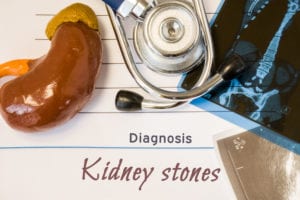Your Guide to Kidney Stones

What are Kidney Stones, and What Causes Them?
The term kidney stones implies that formations develop only in the kidneys. This isn’t necessarily true for everyone. Kidney stones may also occur in the urethra or the bladder. Crystals can form within any of these structures when the ratio of fluid to wastes in the blood is imbalanced. Too much waste and too little fluid may allow certain particles to stick together. This is what we refer to as kidney stones.
Types of Kidney Stones
Common types of kidney stones include:
- Calcium stones. This is the most common type of kidney stone diagnosed today. These stones are made of calcium and oxalate, a chemical that is contained in most foods. Some calcium stones are comprised of calcium and phosphate.
- Uric acid stones. This type of kidney stone develops when the urine is highly acidic. Uric acid particles may clump together on their own or with calcium particles.
- Struvite stones. This type of kidney stone is made of ammonium, magnesium, and phosphate. Struvite stones may result from urinary tract infections that cause a buildup of ammonia in the urine.
- Cystine stones. The body naturally makes a chemical called cystine. In rare cases, cystine can escape the kidneys and enter the urine. Cystine kidney stones are associated with a genetic disorder.
Symptoms of Kidney Stones
Smaller kidney stones may develop and pass without any symptoms whatsoever. Larger stones, on the other hand, may pass with symptoms such as:
- Sharp, intense pain in the lower abdomen or back
- Blood in the urine
- Difficulty urinating due to blockage from a large stone
- Nausea or vomiting
Do Kidney Stones Need Treatment?
Some kidney stones can pass on their own with the assistance of pain medication and adequate hydration (drink plenty of water). Others need to be broken into smaller fragments so they can pass more easily. To determine the best approach to kidney stones, a urologist will order tests to measure size and location.
If you suspect that you may have a kidney stone, don’ suffer needlessly. Schedule a consultation at our Chattanooga office. Dr. Shridharani can evaluate your symptoms and develop a plan of care tailored to your needs. To arrange your visit, call (423) 778-4MEN (4636).


